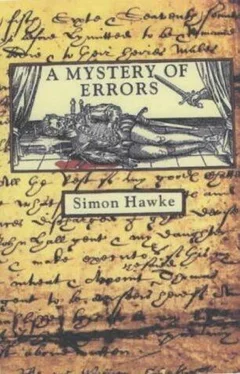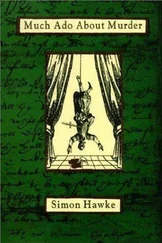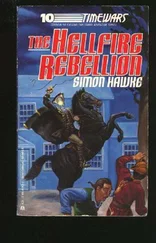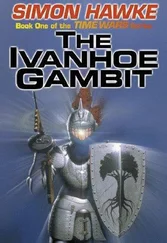Simon Hawke - A Mystery Of Errors
Здесь есть возможность читать онлайн «Simon Hawke - A Mystery Of Errors» весь текст электронной книги совершенно бесплатно (целиком полную версию без сокращений). В некоторых случаях можно слушать аудио, скачать через торрент в формате fb2 и присутствует краткое содержание. Жанр: Исторический детектив, на английском языке. Описание произведения, (предисловие) а так же отзывы посетителей доступны на портале библиотеки ЛибКат.
- Название:A Mystery Of Errors
- Автор:
- Жанр:
- Год:неизвестен
- ISBN:нет данных
- Рейтинг книги:3 / 5. Голосов: 1
-
Избранное:Добавить в избранное
- Отзывы:
-
Ваша оценка:
- 60
- 1
- 2
- 3
- 4
- 5
A Mystery Of Errors: краткое содержание, описание и аннотация
Предлагаем к чтению аннотацию, описание, краткое содержание или предисловие (зависит от того, что написал сам автор книги «A Mystery Of Errors»). Если вы не нашли необходимую информацию о книге — напишите в комментариях, мы постараемся отыскать её.
A Mystery Of Errors — читать онлайн бесплатно полную книгу (весь текст) целиком
Ниже представлен текст книги, разбитый по страницам. Система сохранения места последней прочитанной страницы, позволяет с удобством читать онлайн бесплатно книгу «A Mystery Of Errors», без необходимости каждый раз заново искать на чём Вы остановились. Поставьте закладку, и сможете в любой момент перейти на страницу, на которой закончили чтение.
Интервал:
Закладка:
The main problem, aside from the awkward writing, which clearly, at least to his eyes, showed an author whose talents were well and truly on the wane, was that the characters were not very well delineated. They were stock characters, and nothing more. They had no complexity and were not drawn with any imagination. There was nothing to differentiate them from any number of similar characters in similar situations, which the audience had seen many times before. They were crude rather than subtle, snide rather than clever, bitter rather than ironic, and loud rather than brash. In short, every brushstroke throughout the play was broad and heavy-handed. And Shakespeare was not sure how to fix it short of simply tearing it all up and starting over. Unfortunately, that was not an option.
After agonizing over it for hours, he had finally decided on a course of action that might, perhaps, allow him not only the chance to prove he could improve this play, but gain more time to do so in the process, while still managing to meet the deadline. The trick, he thought, would be to improve the play in stages.
They had already committed to the next performance; the playbills had all been posted. The company could, if absolutely necessary, decide to put on another play at the last moment, but that might not sit well with the audience. Therefore, he decided to select certain scenes throughout the play where the alteration of a line or two, or even a short speech, would effect a slight improvement or produce a bigger laugh, so that the actors would not find themselves in the difficult position of having to learn too many new lines in only a few hours, at best. Then, he would spread the changes out in such a manner that they would gradually move the play along in a new and hopefully improved direction. But to do this, he would have to map out all the changes first, before deciding on the stages in which they would progress. He had spent most of the night and early morning doing so, and now he was exhausted.
He had been working by candlelight when Smythe went to sleep and he was still working in the morning when Smythe got up and went out to see Sir William. Shakespeare wondered how that was going. He felt a bit concerned for his friend, but reasoned that Smythe seemed to know what he was doing. Shakespeare still found it difficult to believe that Sir William was actually Black Billy, the legendary highwayman, but Smythe seemed certain of it and he had learned by now that his roommate was not given to idle flights of fancy. He was anxious for Smythe to return, so that he could hear all about their meeting. It would surely be a great deal more interesting, he thought, than working on this miserable play.
He put down his quill, removed his light, close-fitting, deerskin writing glove, which had no mate for he had made it himself to keep the ink off his fingers, and rubbed his eyes, wearily. For a moment, his tired gaze focused on the quill, which he had laid flat on the table, and the well-worn, ink-stained writing glove beside it. The parchment, quill, ink pot, and glove looked rather like a still-life composition, the sort of thing that art students would practice at before they moved on to the more advanced techniques of portraiture. And, coincidentally, it also made, in a sense, for a portrait of his life… what it had been, and what it could yet be. The product of the glovemaker, next to the product of the poet. He could go in either one direction or the other. And this present task might well establish which direction that would be.
Perhaps it would not all come down to this, he thought. Even if he failed at this task of doctoring the play, there could yet be other opportunities to prove himself, though he did not know when or even if those opportunities would arise. The iron was, perhaps, not yet glowing hot, but it was warm, and it was up to him to strike just right, and in the proper time. He could not afford to dwell upon the play’s deficiencies and bemoan Greene’s clumsy unoriginality. To keep thinking about such things would make the task weigh even more heavily upon him, and he would start to work more and more slowly, taking more and more frequent breaks, and before he knew it, all momentum would be lost entirely. He needed to think of the play merely as a framework, a scaffolding upon which he would build a more solid and finished edifice. It was not the sort of beginning he had hoped for, but it was the beginning he would get… if he could properly begin it.
By the time midday was approaching, he had mapped out all the changes he would make to the whole play and finished the first and second stages. In all, there would be five stages of gradual changes to the play, each one adding new lines and new scenes for every part, and dropping others, until by the time the third stage was completed, it would be a play that was significantly different from the original version-or to be more precise, Greene’s rewrite of whatever the original version may have been-and by the time the fifth version had been staged, it was a completely different play entirely. This way, Shakespeare thought, the actors would not be overwhelmed by having to learn too many different lines and scenes and cues, and the audience would have an unusual opportunity to see a work in progress, a play being performed even as it was being rewritten. It struck him as a novel experience, and anything new could only help the Queen’s Men at this point. They certainly needed help of some sort after that last performance.
Now all that remained was to get the play to Burbage and, unless it was deemed completely unacceptable, a frenzy of activity would begin down at the Theatre. It would be necessary to make a clean and legible “fair copy” of the play for submission to the Master of the Revels, for which purpose a scribe was usually employed. Poets… or playwrights, as some thought poets who wrote plays should be called, though this made it seem more like a craft rather than an art… were not generally known for their calligraphic skills. Their first drafts were usually covered with ink blottings and crossed-out lines and changes written in the margins and between the lines and, not infrequently, food and ale or wine stains. Hence, the term “foul papers” for the manuscript initially submitted.
The company scribe who made the fair copy was often the bookkeeper, and he needed to be especially trustworthy, for no acting company wanted to see any of its plays fall out of their hands or, worse yet, be published. That would mean that rival acting companies could get their hands on them and thereby stage rival productions. Of course, there was really nothing to prevent a rival company from sending people in to mingle with the audience at a popular play staged by the competition and thus try to copy down the lines, but this was a rather more difficult and time consuming enterprise, not to mention potentially risky if the offending copyist was caught in the act.
In this case, Shakespeare knew that there would not be time enough to produce a fair copy of the play before the next performance, which entailed several potential problems. The first order of business would have to be producing new scrolls for each actor, detailing the alterations in each part. Fortunately, his handwriting was reasonably legible, for given that only a few hours remained until the next performance, everyone in the company would be enlisted in this task, which was usually the province of the bookkeeper. The remainder of the time would be spent in learning the new lines and blocking out any necessary changes in the action on the stage. It would not be easy, but Shakespeare had anticipated this and allowed for it by the expedient device of altering the play in stages. And that was both a solution to the problem and a potential problem in itself.
The fair copy that would be produced would most likely be of the finished fifth stage of the rewritten play. In the meantime, the actors would participate in having their individual changes written out. Under ordinary circumstances, this would be the province of the bookkeeper, who would take the edited and marked-up manuscript that came back from the Office of the Revels and write out each part separately on scrolls, which would then be handed out to the actors who would play each part. Except that in this case, there would be no time to submit a fair copy to the Office of the Revels, and consequently, no time to have it reviewed and stamped.
Читать дальшеИнтервал:
Закладка:
Похожие книги на «A Mystery Of Errors»
Представляем Вашему вниманию похожие книги на «A Mystery Of Errors» списком для выбора. Мы отобрали схожую по названию и смыслу литературу в надежде предоставить читателям больше вариантов отыскать новые, интересные, ещё непрочитанные произведения.
Обсуждение, отзывы о книге «A Mystery Of Errors» и просто собственные мнения читателей. Оставьте ваши комментарии, напишите, что Вы думаете о произведении, его смысле или главных героях. Укажите что конкретно понравилось, а что нет, и почему Вы так считаете.












